Future of Video Games and Esports




“Diverse
Marie-Claire Isaaman, CEO, Women in Games




“Diverse
Marie-Claire Isaaman, CEO, Women in GamesIn games, the possibilities of technology can be applied in a structured and creative way. We are facing a turning point in technological change akin to the Industrial Revolution, and video games continue to shape how we engage with technology and innovation.
Since the earliest video games were invented in the early 1950s, the world has changed in unimaginable ways. There are more people who play video games today than there were people in the entire world when these first video games were built. From cautionary tales to utopian fantasies, video games create the worlds that don’t exist yet. They feed our imaginations, creativity and innate desire to push boundaries and ask: what if?
Games have always been a space in which the possibilities of technology can be applied in a structured and creative way. Take artificial intelligence (AI), for example. It has been used in some form by the games industry since the 70s — and it’s certainly not going away.
Since the 90s, game AI has started to employ sophisticated imitations of human neural networks to produce more immersive and creative work than ever before. Today’s AI can be used to speed up elements of game development, such as playtesting and quality assurance (QA), allowing

The popularity of esports in universities has benefits beyond the screen, and a report finds that the UK is home to the largest student esports community in Europe.
studios to spend more time and budget on more creative or sophisticated tasks. AI can even complement human moderation in online games, helping to manage fast-growing user bases. With 3.6 billion players on the planet, video games serve as an amazing scaffold for the creative abilities of AI.

In recent years, the games industry has contributed over £5 billion to the UK economy, supporting 75,000 jobs across the supply chain, all over the UK.
In 2022, consumer spending hit £7.1 billion — it’s clear that the UK loves to play video games.
As we look to the future and the big challenges we face, not only as a sector but as a society, developing the next generation of era-defining games can help — from learning how to implement technology in a structured and creative way to training the next generation in digital skills, today. The UK video games industry is exciting and fast-growing. The more we nurture it, the greater our chance of creating better social, cultural and economic futures.
While the size of our collegiate esports community spells great things for the growing sector — which, in 2019, contributed £111.5 million to the UK economy — leaders in the education space should consider the valuable transferable skills that playing video games competitively brings to the workforce of tomorrow.
From university to esports industry
Ukie’s report, published in partnership with The Story Mob and supported with new data from YouGov, notes that university-led esports organisations offer structures for esports players to directly enter professional ranks.
NUEL (National University Esports League) offers the chance to progress to the Europe-wide University Esports Masters while NSE (National Student Esports) delivers the Intel FutureGen programme, selecting 20 talented individuals among the student community and providing them with access to Q&As, workshops, mentors and industry events.
As degrees in esports and scholarships for athletes launch at universities across the country, some industry experts warn that only a finite number of esports jobs will be available to the large numbers of students emerging in the coming years. However, participation in competitive video games at a school and higher education level does not simply build a pipeline from the universities to the esports arenas.
Transferable skills in esports
The report finds that the University of Warwick’s team WASD (Warwick’s Awesome Speedruns and Demos) is the largest student-run charity speedrunning event in the UK, raising more than £6,000 for the charity SpecialEffect to date. This suggests that students are in the process of honing key skills such as strategic thinking, project management and public relations.

Ukie initiative ‘Digital Schoolhouse’ has long promoted the transferable skills of esports, with schoolage participants in their annual tournaments reporting increased interest in computing, as well as better communication and teambuilding skills.

STEM learning in esports programmes
Some teachers also reported that cohorts of pupils who were usually uninterested in extracurricular activities were engaged and encouraged by the programme. The benefits of extracurricular activities are welldocumented, but esports has a clear relationship with STEM subjects and skills highly prized in a digital economy — with approximately 70% of NSE participants enrolled on a STEM course.
Evidence from the MIT Press suggests the right kind of esports programme can encourage skills such as understanding of scientific methodology, use of data and evidence and technological proficiency.
With 3.6 billion players on the planet, video games serve as an amazing scaffold for the creative abilities of AI.WRITTEN BY Sam Collins Co-CEO, Ukie
Creating innovative games that tap into expert and educated consumers is proving to be a successful formula for video game and accessory companies.
In the highly competitive video gaming arena, creating unique products for consumers remains a major challenge. Industry experts also underline the importance of being agile, flexible, and willing to respond and react as trends change.
Finding the right segment of the market
While major players continue to dominate market share, a secondary tier of companies are being innovative in the games and accessories they produce and market. One of these companies is NACON, which have carved a strong position in the video gaming industry as creators, developers and publishers of video games and designers and manufacturers of gaming accessories.

Stepping away from giants such as FIFA and NBA basketball video games, its products tap into consumer interest in rugby, tennis, cycling and skateboarding. “Our positioning when it comes to developing games is to find the right segment of the market, where there is also business potential but talking to very educated, expert and engaged players,” says David Talmat, Head of Marketing for NACON.

The company produces a variety of games, including simulator games and action-adventure games. Simulator games allow players to experience the life of people doing specific jobs, such as chefs,
train drivers or taxi drivers. Action adventure games are targeted toward hardcore gamers and include combatdriven games, such as Steelrising, which is based on the French Revolution; and Ravenswatch, which explores nightmare scenarios.
They have a history of developing licensed-based games. For example, a RoboCop game is scheduled for release in November, and other titles will be released during the back-toschool season. Talmat says: “We are creating unique experiences and have a dedicated licensing department that signs deals with brands to put in our games.”
Growth as a games developer
NACON went public on the French stock exchange in March 2020, just before the Covid-19 pandemic lockdowns, which saw video game sales rise. The company raised €110 million and used the funds to acquire 16 different development studios, representing around 900 developers. This move transformed them from a publisher and accessory specialist into a full-fledged games developer. Talmat says: “We acquired those studios because they developed games that were in line with our DNA, ambition and strategy.”
They also acquired several expert development studios, including KT Racing, an expert racing games developer; and Big Ant Studios, an Australian studio that specialises in sports games. The goal is to give these
studios the autonomy and resources they need to make better games every year. This strategy has already paid off, as their games have received significantly higher Metacritic ratings in recent years.
Offering premium accessories
Premium accessories are a major part of business, accounting for around half of its operations. This focus on accessories has been led by Yannick Allaert, who heads the accessory business unit and joined the company as Falc’s first intern 38 years ago. While brick-and-mortar retail sales have declined due to the rise of digital sales, there is still value in having a network of retailers and distributors in more than 100 countries. This allows the company to reach a wider audience and provide its customers with the best possible experience.
Understanding consumer demands Picking the right partners and bringing new experiences to market for consumers is critical to surviving in a highly competitive field.
“Consumers are more and more demanding, and more expert, so you have to bring something different for them,” Talmat explains. “To do that, you need to have all the ingredients for success: creative people, good marketing, innovation, flexibility, trend-setting and an understanding of your consumers.”

Innovative video games are successful for expert consumersPaid for by NACON WRITTEN BY David Talmat Head of Marketing, NACON
We are creating unique experiences for expert gamers.
Human beings are hard-wired to enjoy games, says Professor Chris Headleand, Head of the Games Development Department at Staffordshire University. “It’s a natural, fundamental desire in all of us,” he explains. “We learn how to play before we learn how to talk.”
Career opportunities in video games industry
This may explain why billions of people globally have a deep-rooted passion for video games. According to trade body Ukie, the UK industry was worth £7.05 billion in 2022. But it’s not just the playing of video games that has become so staggeringly popular. More and more students want to be part of the video games sector and are craving jobs as artists, designers, programmers and developers. As such, they are turning to universities that offer degrees in these subjects.
Celebrating 20 years as a games educator
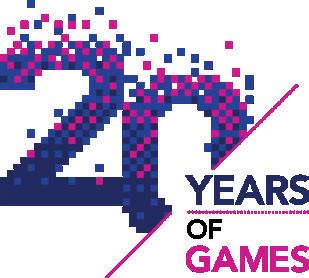
Staffordshire University has the largest games department in the UK, with more than 1,800 students across two campuses. In the academic year 2023/2024, it celebrates its 20th year as a games educator. “As a dedicated games department, we run many specialist courses, from concept art all the way to games programming,” says Professor Headleand.

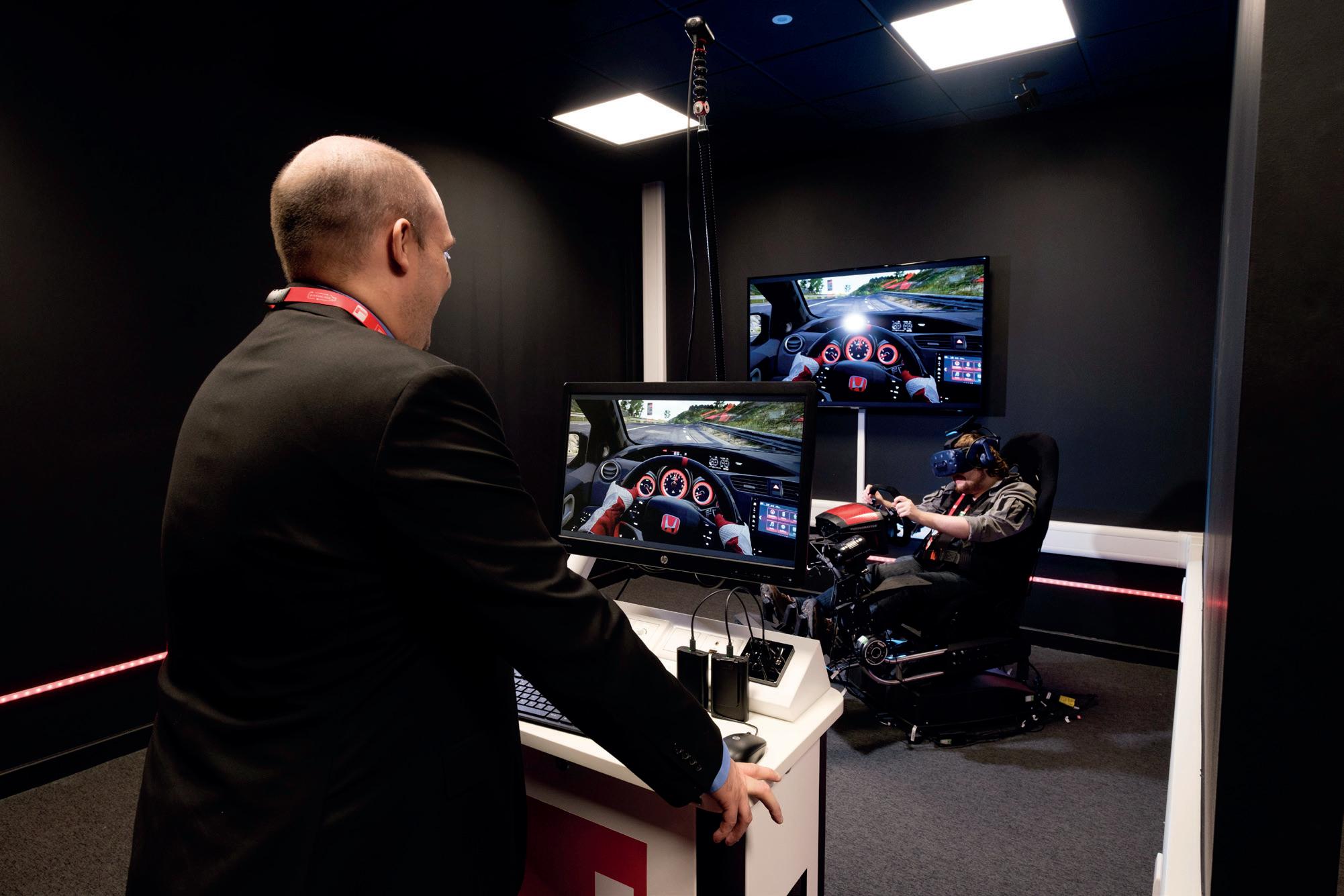
“Of course, we can’t afford to sit on our laurels because this is such a fast-moving space. Innovations are
happening all the time. When we design a course, we aren’t preparing students for today, we are preparing them for what they’ll encounter in three years.” To ensure undergraduates are taught the most appropriate skills, the department works closely with industry partners and colleagues — plus technology companies outside the sector — to understand the type of expertise they require.
Video games landscape and opportunities in the UK
For anyone considering a games education, Professor Headleand has this advice: “The UK games sector is an amazing place to work,” he says. “There are some big, long-standing studios here that have been creating Triple-A titles for many years, plus hundreds of smaller independent operators. However, the skills that games graduates learn are inherently multidisciplinary and can be applied in all kinds of sectors. A games programmer is fundamentally a computer scientist who understands design, interaction and engagement. So, broaden your employment horizons and consider jobs within and beyond the games industry.”
Games technology found in numerous industries
Professor Headleand knows games graduates who have found careers in various sectors including logistics; sales and marketing; manufacturing; and banking. “Video games technology is found everywhere,” he

says. “It’s in virtual reality exhibits in museums and zoos. It’s in simulators that train surgeons and pilots. It’s in wearable activity trackers and stateof-the-art exercise bikes in the health and fitness sector.
“That car manufacturer’s configuration system that helps customers create bespoke design features in their vehicles — it’s probably been built by a games graduate. Gamification is being deployed in many non-game environments to make routine tasks enjoyable, engaging and interactive.”
Preparing students for emerging technologies
As technology continues to develop, students can expect games education to become more exciting. “The number of tools available to us now — and the things we can do within a games engine — has moved so far forward,” explains Professor Headleand. “There are more largescale studios producing incredibly detailed, high-budget games that are works of incredible fiction. We aren’t far away from being able to call these games ‘interactive movies’ — so that’s something we should be prepared for … It’s an exciting time for students, and we want them to find their dream careers when they graduate. Ultimately, it’s our job to ensure that they don’t just leave here with a certificate but that they are prepared for the world they are entering.”
The skills that video games students learn are inherently multidisciplinary and can be applied in all different sectors. It’s what makes a games degree sought-after.
Why exciting career opportunities are everywhere for video games studentsPaid for by Staffordshire University
Gamification is being deployed in many non-game environments to make routine tasks enjoyable, engaging and interactive.INTERVIEW WITH Professor Chris Headleand Head of the Games Development Department, Staffordshire University SPREAD WRITTEN BY Tony Greenway Images provided by Staffordshire University
Placements that give students practical gaming experience are an invaluable way for them to grow and develop their skills for a job in the industry.
Theory is an important part of learning. However, there is no substitute for rolling up your sleeves and getting hands-on experience — particularly in video games design. “Students benefit from working on real games,” says Professor Chris Headleand, Head of Games Development Department, Staffordshire University.
“In the games industry, we often talk about the importance of ‘getting your first title,’ which means getting your name attached to a commercially released game for the first time. It makes you extraattractive to companies in the sector.”
Placement for practical gaming experience
With that in mind, Staffordshire University now runs an annual six-week summer paid placement scheme called 1UP. This is open to 30 students across all levels who are employed to build commercially ready video games in the university’s in-house games studio, Bulldog Studios, which was created for the initiative and is run by industry experts. The scheme launched in 2022 and has been a success, winning ‘Best Education Initiative’ at last year’s prestigious TIGA Games Industry Awards.
Inclusive, hands-on opportunity
“Six weeks isn’t a long time,” admits David James, Course Director of Games Design. “So, 1UP students hit the ground
running by working on projects that have been partly made by the staff, developing these into commercially ready products by the end of their placement. Because the scheme is open to students from all levels, even those at foundation year can receive invaluable hands-on industry experience and bring in their own ideas.”
Critical feedback to develop industry skills
To give students a proper insight into the games industry, the placement has been deliberately designed to mirror industry practices. “As lecturers, we act as directors, producers and technical experts, giving students critical feedback in daily meetings,” explains Molly Swift, Associate Lecturer in Concept Art for Games and Film. “That’s vital because they will certainly receive critical feedback in a professional studio environment. It can be a steep learning curve for some, but it means they will develop all the skills they need to work at a commercial level.”
“One reason for creating 1UP was to provide a bridge between academia and industry,” notes Davin Ward, Senior Lecturer in Computer Games Programming, also at Staffordshire University. “Many Level 4 students who took part in the 2022 scheme have won industry placements while Level 5 students — who have since graduated — have found jobs in the games industry and beyond.”
Educators are making sure that their students are switched on to the growing importance of diversity and inclusion topics in the gaming and esports industry.
Traditionally, gaming and esports have not been known as particularly diverse and inclusive. Reports from the Ukie UK Games Industry Census (2022) consistently show that male employees outnumber female and non-binary employees. There’s also a disproportionate ratio of white employees to people of colour and straight employees to LGBTQ+ employees.
Yet, an interesting shift is happening, says Dr Ying-Ying Law, Course Director Esports, Staffordshire University. The sector is moving away from homogeneous character representations and taking a more diverse and inclusive stance.

“Twenty years ago, gaming was marketed towards a particular audience,” says Dr Law. “The stereotypical view of a gamer was white, male and straight. But when I conducted my PhD research between 2012 and 2016, I found that communities involved in games were more diverse in certain play practices - such as cosplay - and organisers of gaming events were trying to reach out to a wider audience.”
Anonymity encouraging freedom of expression
Jamie Nicholas — Associate Lecturer at Staffordshire University specialising in visual effects and queer theory — agrees that a change is happening. “That’s because gaming is a space where people can discover themselves and then become themselves,” he says.

“Often, the anonymity of online games allows them to express their gender identity and sexuality and be whoever they want to be: gay; straight; pansexual; non-binary. People — including students — have told me this is why they got into games in the first place. They’ve since become, or will become, part of the industry’s workforce.”
Inclusivity in games and esports modules
The education sector is also embracing diversity and inclusivity. At Staffordshire University, educators have adapted teaching methods and developed an inclusivity pipeline into games and esports modules.
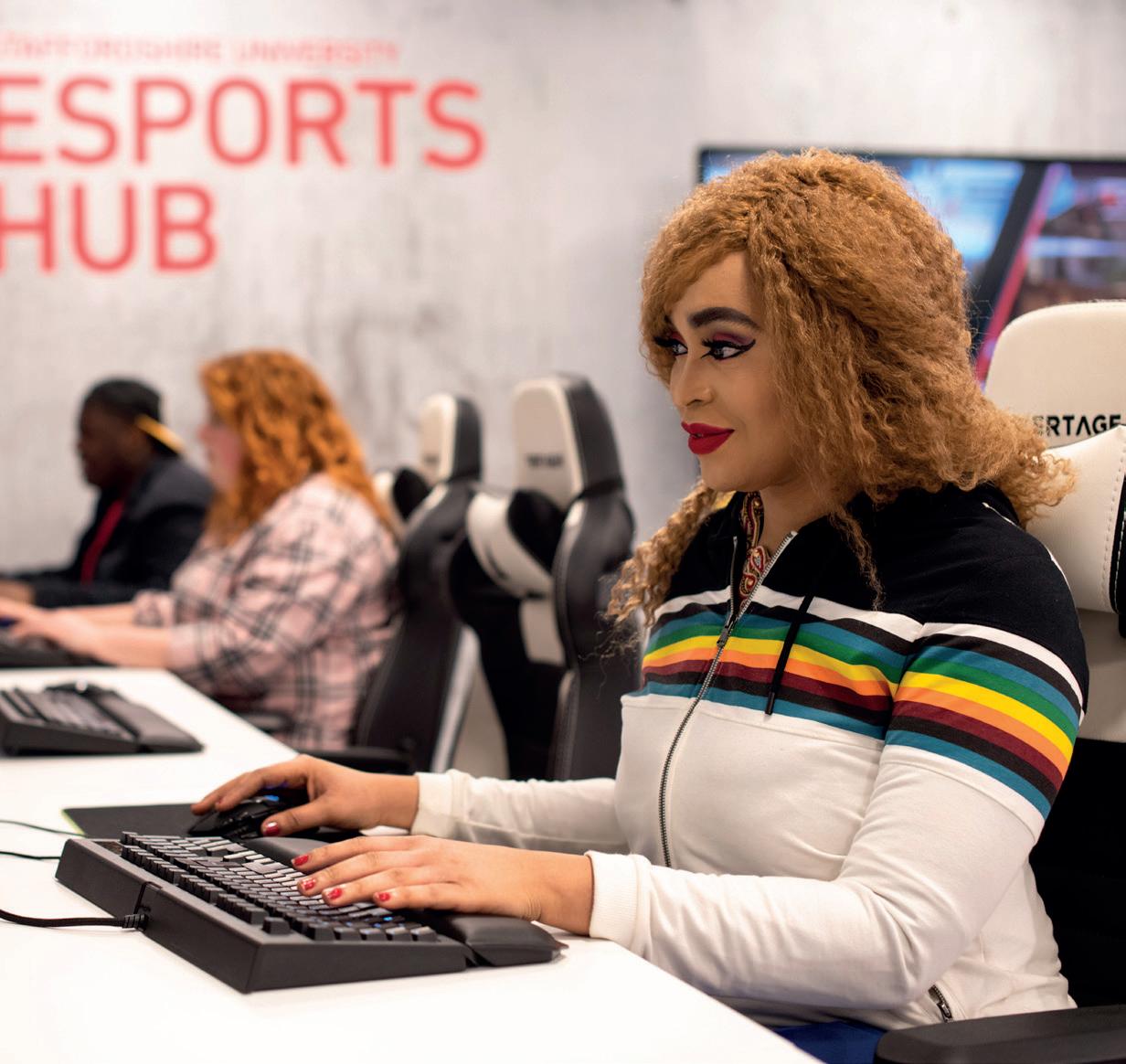
“We make our students aware of how important diversity and inclusion topics are,” says Dr Law. “Academic assignments and projects include matters related to gender, age, race,
class, ability and creating accessible games, broadcasts and competitive gaming events to promote inclusivity at a grassroots level.” For example, Fête 1 and Fête 2, a major grassroots Smash Bros. tournament hosted at Staffordshire University, featured pride activities, including an LGBTQ meetup and a series of women’s crew battles called ‘Smash Sisters.’
“It’s great to see students exposed to new ideas and become critically aware of issues relating to diversity and inclusivity,” says Dr Joshua Jarrett, Senior Lecturer at Staffordshire University. “Particularly if they were not fully aware of these issues prior to joining our courses.”
Why practical experience is the best way to get gaming students ‘industry-ready’
Diversity and inclusion growing in gaming and esports — here’s why
The placement has been deliberately designed to mirror industry practices.INTERVIEW WITH Davin Ward Senior Lecturer, Computer Games Programming, Staffordshire University INTERVIEW WITH Dr Ying-Ying Law Course Director Esports, Staffordshire University CONTRIBUTION FROM Dr Joshua Jarrett and Jamie Nicholas CONTRIBUTION FROM David James, Molly Swift and Daniel Bond
Esports business boomed during the pandemic, benefiting from extra eyeballs — and investors. But in 2023, it has challenges ahead. How can it solve them?
The numbers in esports — competitive video gaming — can’t be ignored. Viewership figures in the millions. Prize pools in the tens of millions. Team valuations in the hundreds of millions. Brand sponsorship deals from the likes of Gucci, BMW, Mastercard. Global leagues that stretch from Seattle to Stockholm to Shanghai.
The world of opportunity in esports Esports has attracted attention from all corners of the world as video games have morphed from a belittled bedroom hobby into big business. League of Legends World Championships draw several million concurrent viewers, featuring guest performances from Imagine Dragons and Lil Nas X in often sold-out stadiums.

Marketers seek to tap into its valuable audience, one billed as increasingly hard to reach via traditional advertising channels thanks to adblock and ad-blindness. The core esports audience is largely made up of Gen Z and millennials, who are techsavvy digital natives — an advertiser goldmine.
Funding and revenue challenges
The rapid growth of esports as a spectator event in recent decades saw it billed by many as the future of sport, and investors pumped billions in as a result. But not all is rosy in the much-touted world of esports business. Venture capital funding runways are keeping large parts of the industry afloat as, despite their cultural clout, most esports teams and leagues are still searching for ways to balance the books.
The reasons why many of these newfound media empires are unprofitable are numerous and complex. Among the challenges faced by the industry is an alarming scarcity of the kind of valuable media rights seen in sports and an overreliance on sponsorship revenue amid a looming economic downturn.
Esports gaining recognition
Yet, away from the shiny lights of world championships, a booming tertiary sector is building infrastructure to bring esports to the vast majority of casual gamers, potentially widening esports’ total addressable market severalfold.
Interest in esports among schools, colleges and universities, inside and outside curriculums, is booming. The Olympics are turning to esports to help shore up viewership among younger viewers, and even governments are starting to take note of esports.
It is against this backdrop that the industry will congregate this year at ESI London, a business conference that convenes industry leaders and stakeholders. Brands, teams, educators, game developers, lawyers, government stakeholders and more will come together to solve problems, discuss opportunities and analyse industry trajectories as esports defines its future.
WRITTEN BY Jake Nordland Features Editor, Esports Insider WRITTEN BY Dr Richard Wilson OBE Chief Executive Officer, TIGA
WRITTEN BY Dr Richard Wilson OBE Chief Executive Officer, TIGA

To ensure the UK remains the best place for the gaming industry, the Government needs to create an environment favourable for investment and sector growth.
The UK is home to a vibrant video games industry, lauded for its innovation and unique storytelling capabilities. The sector also makes a substantial contribution to the UK economy and supports rewarding careers.
According to research by The Independent Game Developers’ Association (TIGA), headcount in the UK video games industry has grown by an annual average of over 9% since 2014. For our industry to maintain its edge on the global stage, sustained Government support is paramount.
In the past decade, TIGA has been instrumental in lobbying the UK Government to introduce and maintain policies that strengthen our industry. Chief among these was the establishment of Video Games Tax Relief (VGTR), soon to be the Video Games Expenditure Credit (VGEC).
about cost-saving measures. It’s about enabling studios, especially newer or smaller businesses, to bring their creative visions to life and to scale up and grow.
The UK Games Fund is designed to empower young game developers and early-stage studios to transform ideas into working prototypes and showcase them to potential investors. It’s set to receive an uplift of £5 million from the Government. With this funding, the UK Games Fund’s total resources will reach £13.4 million over the next two years.

Moreover, the Government has announced plans to invest a minimum of £50 million in the upcoming wave of the Creative Industries Clusters Programme, led by UK Research and Innovation (UKRI).


The sector also makes a substantial contribution to the UK economy and supports rewarding careers.
It incentivises development by allowing studios to claim back a substantial portion of production costs. It also enables the UK video games industry to compete on a more level playing field against studios in other jurisdictions. VGTR has been critical in driving dramatic headcount growth in the sector since 2014.
Fostering innovation is not merely


The introduction of a larger UK Video Games Investment Fund (VGIF) will also give developers the necessary financial support for our industry to reach its full potential. This would provide pound-for-pound match funding of £75,000-£500,000, empowering studios to realise projects.
Research indicates that establishing a VGIF could create over 1,400 direct and indirect jobs over five years. Countries like Canada, the USA and China are heavily investing in their domestic industries. If the UK is to maintain its standing and seize a larger share of this market, Government support must not waver.
Most esports teams and leagues are still searching for ways to balance the books.
The esports industry remains strong. Viewership continues to grow, standards are rising and exciting games are on the horizon, making it a valuable marketing channel for brands.
WRITTEN BY Khang Thai Senior Global Marketing Esports Manager,

Is the esports hype over? In short, no. Sure, brands that have spent millions on esports partnerships over the years are cutting budgets, teams are disbanding and publishers are deprioritising esports efforts. However, esports is among the most captivating industries in the world and is an undeniable marketing channel for those looking to tap into the $1.87 billion gaming industry. I’m bullish on the future of esports. Here’s why:
Viewership is growing
League of Legends, among the most popular esports games globally, is in its 13th season and its viewership numbers have grown, approximately 10% year-on-year (YOY), to roughly 5.15 million viewers in 2022. The VALORANT Champions Tour peak viewership exploded by a staggering 30% from 2021 to 2022, and viewership for the Mobile Legends: Bang Bang World Championships has grown 12% YOY hitting 4.2 million this past M4 tournament.

Fighting for higher standards
For years, FaZe Clan and Team SoloMid (TSM) have been the esports operating model. Their respective teams produce great content and are strong contenders with loyal, engaged followers. Yet, FaZe Holding’s stock plummeted 98% this year when investors defaulted on a large sum of money, and TSM’s naming partner Futures Exchange
(FTX) filed for bankruptcy. These examples expose that esports businesses can’t run on hype alone; they need fundamental business acumen to operate more responsibly and effectively.
Great esports games are coming

At Evo 2023, the biggest fighting game esports event, Riot Games unveiled their new fighter, codename Project L. Similarly, Valve teased Counter-Strike 2 and is beta testing an update to Counter-Strike: Global Offensive that’s been in development for a decade. Community reaction is strong, and gamers are hungry for these releases; just two examples of publishers continuing to put players first — building competitive titles their communities will love. Esports organisations can add massive value to brands. Especially for those looking to tap into gaming, investing in esports is not an easy choice. However, with a long-term strategy, it’s a way to reach an engaged and impressionable audience.
Esports is a part of Razer’s DNA. We made our mark building products that give pro players a competitive edge, and we continue to invest in and sponsor esports teams that share their expertise and shape our products for professional and casual gamers alike.

Former champion gamers are transferring their computer console skills into lecture halls to help younger enthusiasts turn their passion into a career, not just as competitors but in areas supporting the genre.
The hope of those running threeyear university degree courses in the burgeoning esports arena is to break down stigmas and stereotypes surrounding gaming.
The esports course at the University of Chichester covers all aspects of electronic video gaming, harnessing the 20+ years of experience Rams Singh has as a player, manager and coach. Now entering its fifth year, the esports course includes production, esports events management and modules on marketing, branding, running a business and tactical play.
“A further aspect that is highly important is sports sciences — mentality, physicality, nutrition and psychology,” says Singh, who joined Team Dignitas as a player in 2006 and in Trackmania was one of the first to represent the UK in the Electronics Sports World Cup in 2006.
As a senior lecturer on the course, Singh points to the career opportunities esports offers. “It opens up the world to young gamers to help them understand aspects of what content creators do,” he explains. “Careers are vast, not only as a pro gamer but team leader, event organiser and coach; with marketing and PR opportunities — and it allows you to travel. The skills from the course are very transferrable.” The course is based within the university’s recently opened tech park with high-end PCs where tutors observe students as they play and offer firsthand coaching.
The facilities also include social spaces where esports students can meet other like-minded students. Singh underlines a life–gaming balance. Keen to break down stigmas associated with gaming, he emphasises that, in the digital age, there are numerous jobs where people spend a lot of time on-screen. “My students do more than sit behind a computer,” he adds. They do fitness, socialise and eat healthy — and we offer that balance on the course.”
INTERVIEW Rams Singh Senior Lecturer in Esports, University of Chichester
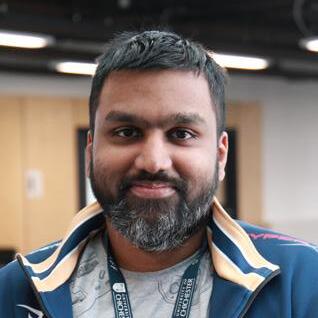
 WRITTEN BY Mark Nicholls
WRITTEN BY Mark Nicholls
What is the computer games development course like?
It’s a three-year undergraduate course with a fourth year in industry and centres on software engineering to get students up to speed with the C++ programming language, expanding that into understanding different domains and what goes into building an AAA game.
What will the students learn in the course?
It will help them develop a critical eye to spot techniques and how a game is built — while playing. Coursework, centred around programming and development skills for games, are practical and involve building game prototypes and components as students demonstrate their technical ability.
Who are potential recruits for the course?
They are expected to be passionate gamers, but we are not insisting on students having maths or computer science A-levels or BTECs. We want people who are interested in learning how they can apply the toolbox. There is maths, but in the context of using it.
our laboratory and use as many industry-standard tools as possible. Our hardware is high-end Intel and Nvidia gaming machines to develop code on. With software, as C++ is the main programming language, we use Microsoft Visual Studio and have access to Unreal Engine 4+5.
We also have tools for managing code collaboratively and art packages for programmers to understand how to work with artists and get content into games. We belong to the PlayStation First partnership, giving students access to PlayStation 4+5 development kits.
We also have tools for managing code collaboratively and art packages for programmers to understand how to work with artists and get content into games.
These elements form a developer’s toolbox for creating immersive game mechanics and understanding the right context for using them. For example, how they want a character to behave, or a car to steer, and learning the mathematical building blocks to achieve that.
What equipment is available to students?
At LJMU, we bring the games industry to students in

What are the career opportunities for graduates?
They will get a foot in the door as a game programmer. A lot gravitate toward AAA video game companies and big studios as software engineers pursuing their passion and learning the latest technologies. However, they are not restricted to the gaming industry, as gaming technology is used in many different domains — whether simulation or extended reality. The skills are reusable and transferrable.

How does Liverpool’s gaming heritage benefit students?
From the early 80s, many iconic franchises have come out of this region. Liverpool remains an industry hotbed; and with smaller studios, it has a strong community feel. There are opportunities to meet developers, who are so helpful to our students, go to local events and integrate into the development community.
An independent group of personnel known as ‘people managers’ are bringing a new level of equality and opportunity within a global video games organisation.

People managers have a pivotal caring role that embraces diversity and equality. They have a unique position within the workplace and sit separately from any HR function, instead deployed in a wider role designed to benefit personnel at all levels.
Role establishing equal opportunity
Marina Surdu, Senior Talent Acquisition and Employer Branding Specialist at IOI, explains that people managers are one of the most important ways they ensure equal opportunity for career growth for staff. “They are separate from HR or production, and their main goal is to work with the wider organisation and developers towards their professional and personal development,” she says. IOI, which aims to create entertaining and impactful game experiences for players and communities worldwide, passionately believes that everyone within the organisation is given equal chances at career growth via a well-thought process.
Niklaes Cristian Toft Larsen, Art People Manager, says: “Equal chances at career growth give opportunities for new ideas that we could not discover otherwise. That makes everyone a part of this mission.”

Ensuring development across disciplines
IOI has people managers for each discipline, such as design, tech and art. Each is an expert at people development and strategy, with rich experience in their respective craft. Underlining the importance of independence within their unique roles, Surdu says: “That means they are unbiased and are key stakeholders focused exclusively on people and their growth, wellbeing and offering the best conditions, so people can achieve their potential.
“They work with production, studio management and HR to ensure their strategies are in place and the organisation carves room for people’s development.”
Freedom in career path
BY
The people managers have implemented a studio-wide process for career development and implemented it across the organisation. “They have developed a career ladder that is well-defined in terms of seniority levels and the skills needed under each: both craft-related skills but also in terms of behaviour, proactivity and communication,” continues Surdu.
Recognising that not all developers necessarily want to move up the ladder, the organisation also accounts for those who want to expand their knowledge. “We give them the freedom to take up something completely different than their craft or follow passion projects that deepen their expertise,” she continues. “We call these side-quests.”
Having dedicated people managers for each craft allows them to have an overview of everyone’s ambitions and prepare concrete steps with regular reviews to help individuals achieve their goals.
As Design People Manager Stine Louise Norstrand notes: “When working with passionate people like game developers, we need to remember to show them respect for the time and passion they invest. That goes for their career, wellbeing or everyday work they do.”

The flat hierarchy in place at the company is designed to give everyone room at the same table. “One of our values as a studio is ‘dare to lead’ and having a framework like this in place is a prime example of how we enable this value,” Surdu adds. “Knowledge, approach and passion need to be acknowledged too, and our developers want that.”
Enabling equality and inclusion
So, how does the flat hierarchy impact equality? “Giving the right people the support system to show their worth and make decisions means you give a voice to people who are otherwise shy, lack confidence or otherwise unseen and underrepresented in big organisations,” she explains.


“By having a standard process for all, they get to build a trust-based relationship with their people managers, express their ambitions and have support throughout.” She says there is an indisputable premise that everyone should have equal opportunities regardless of ethnicity, faith, neurodiversity, gender expression or sexual orientation. “We advocate positive support for women, trans, queer and all the colours of the rainbow,” adds Surdu.

What are ‘people managers’ and how do they enable career growth in gaming?JAMES BOND, and related James Bond Indicia © 1962-2020 Danjaq, LLC and Metro-Goldwyn-Mayer Studios Inc. JAMES BOND, and related James Bond Trademarks are trademarks of Danjaq, LLC.
To attract more women and girls into the games industry, we must build a fairer, safer and more equal environment that will empower them.
The games industry, like many other sectors of the tech world, has historically been dominated by men. The time for the sector to step up its efforts in embracing diversity is well overdue. We need to encourage more women and girls to consider a career in games; not only because it’s the right thing to do, but also because it makes business sense.
WRITTEN BY Marie-Claire Isaaman CEO, Women in Games
Benefits of having more women in games
• Diverse perspectives lead to innovation: The best games are drawn from different backgrounds and experiences. When a team is more diverse, it brings richer perspectives to the table, leading to innovative gameplay mechanics, more relatable characters and stories that can appeal to a broader audience.
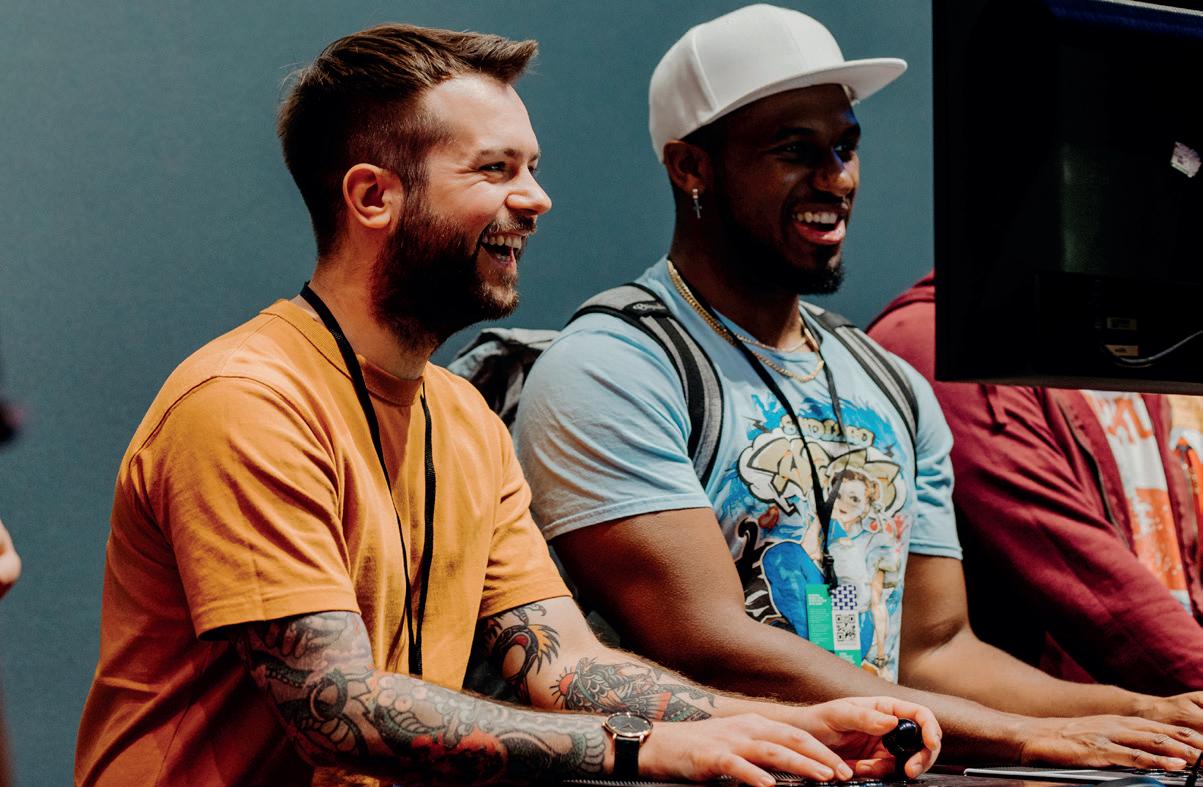
• Reflecting the gaming audience: The stereotype that gamers are predominantly male is outdated. Today, half of all gamers are women. By not having women in key decision-making roles, we risk alienating a significant portion of our audience.
• Economic growth: Diversity in the workplace leads to better financial performance. McKinsey’s 2020 report showed that companies with greater gender diversity were 25% more likely to have above-average profitability than their peers.
How to encourage women into gaming
• Education and outreach: We must start young. Partnering with schools and offering workshops focused on game design and development can spark interest from a young age.
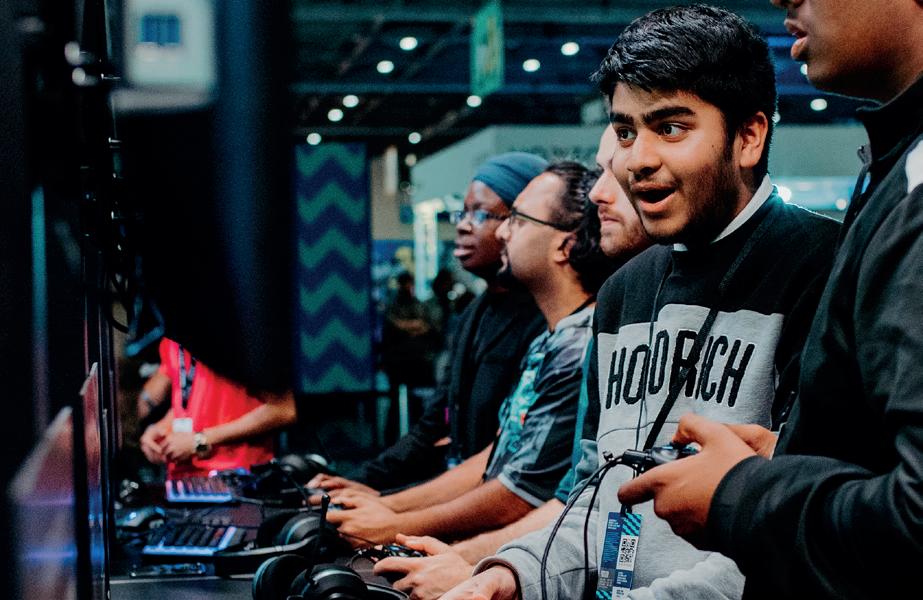
• Mentorship: Women in the industry should take on mentoring roles, guiding newcomers. This creates a support network that is invaluable in navigating challenges and building a successful career.
• Promote from within: Recognising and promoting talent is essential. Companies should ensure they’re giving equal opportunities for leadership roles. This shows commitment to diversity and provides role models.
• Inclusive workplaces: A culture of inclusivity starts at the top. Companies should foster environments where all employees feel safe and valued. This includes creating strict anti-harassment policies and promoting work-life balance.

• Showcasing female talent: Highlighting the achievements of women in the industry can inspire others to follow suit.
• Eradicating toxicity and harassment in gaming spaces: Create welcoming environments for girls and women as participants within the sector.
Unlocking a vibrant, inclusive future
The games industry stands to benefit from attracting more women. The unique perspectives women bring, combined with the undeniable business benefits, make it a no-brainer. As our world becomes more interconnected and gaming continues to grow in cultural relevance, the industry needs to evolve alongside it.
We need to encourage more women and girls to consider a career in games; not only because it’s the right thing to do, but also because it makes business sense.
Representation in the games industry was traditionally biased towards males. However, thanks to a sustained effort to improve gender bias, females are discovering genuine opportunities for career growth.
The global video games industry is vast, and its customers are more engaged than ever.
Exciting improvements in gender bias
It makes sense that the people who make games should reflect the diversity of the world. “If we can put together teams that reflect the public at large then companies making the games will see the positive impact on their end products,” says Joe McKernan, who is Associate Director at Skillsearch, a Brighton-based recruitment company that is leading on pushing for change in diversity and inclusion, in particular gender bias, in the games industry.

It published research, based on surveys with companies, which showed that in the three years up to 2023, there has been a fall from 26% to 13% in the gender pay gap. “This is a big change,” says Freya Simmons, who is Marketing Manager at Skillsearch. “Companies we work with are using our recruiting services because we pride ourselves on rooting out anything that might put off female applicants. We have transparent relationships with clients so we can help them to achieve their gender equality goals,” and this is reflected as they recently helped find work placements for 17 women with their client Krafton.


Ways to improve company recruitment models McKernan offers tailored support to his clients and notes, “Hiring managers ask us how they can improve diversity. Sometimes, job descriptions are written with the previous employee in mind, which is more likely to be a male, so we help to adapt it.”
He has seen big improvements in diversity in the past decade, including an increase in the number of people from Black, Asian, and minority ethnic (BME) backgrounds in the industry. He attributes this to the presence of positive role models in senior leadership positions. Simmons, who conducted a survey on diversity in the video game industry, adds: “At senior level, the gender pay gap has evened up, and in some cases, there are higher female salaries.”
Making good business sense
Serving a global market requires recruiting talented people from all over. As McKernan puts it: “If you’re a Paris-based company but want the top talent from South Korea, you need to be able to work together even if that’s remotebased.” Simmons agrees, adding that: “If you want to promote a game, it’s handy to have local-based marketers on hand.” All of this reinforces the need to pick the most talented people who can bring the range of skills and creativity that this ever-evolving market requires.
Walking around the biggest industry fairs and glancing into business booths demonstrate, once again, how male-dominated game companies still are, Julia Pfiffer points out as Co-CEO of gaming industry player astragon Entertainment. However, she aims to change this with her company.
Transforming gaming with inclusivity

As of August 2023, the entertainment company’s publishing division comprised a 46% female workforce, with another 2% identifying as nonbinary, which exceeds industry standards and highlights a commitment to diversity. “A multifaceted team widens the reservoir of ideas at a company’s disposal. Varied life journeys introduce a rich tapestry of mindsets, viewpoints and methodologies to the professional arena,” insists Pfiffer. Looking to position itself as the go-to for young professionals, the company enables women to be at the forefront of technological and creative advancements, ensuring diverse stories are told and experienced.
Empowering women with representation astragon Entertainment has witnessed a gradual increase in women both as players and professionals. “This trend is likely encouraged by a societal shift in gender equality, the presence of influential female figures in the industry and initiatives aimed at promoting inclusivity — it is a step in the right direction, but still a long way to go,” Pfiffer admits.
Team17 Group PLC, led by CEO Debbie Bestwick, collaborated with Pfiffer and several leading female figures to launch ‘The Purple Panel’ podcast. The series delves into the unique journeys of women within the gaming realm. “Increasing women’s representation in gaming brings a wider range of perspectives, fostering a richer gaming environment for all players and better representing our diverse audience,” she says.
Diversity bridges gaps in gaming experiences
At her company, women have been integral in every department, with its dedication to fostering a secure and confidence-inspiring workspace for all. Its primary objective is to strengthen its reputation within the gaming ecosystem and be known for gender inclusivity and diversity.

For instance, console game ‘Police Simulator: Patrol Officer’ is heavily influenced by astragon’s and its developers’ female team members — from game design and production to PR and marketing strategies. “Their contributions have not only shaped our company’s success but also serve as an inspiration to women aspiring for a career in gaming,” Pfiffer says. “A career in gaming contributes significantly to society by providing entertainment, fostering social connections and even educating through gamification. Our products not only entertain but often bring families together — bridging generational and cultural gaps.”

How a diverse gaming industry adds value to story development and design
Growing a gaming business comes with opportunities as well as responsibilities.
Double Eleven is an independent games publisher and developer that has grown from around 80 to nearly 400 staff in the past few years.
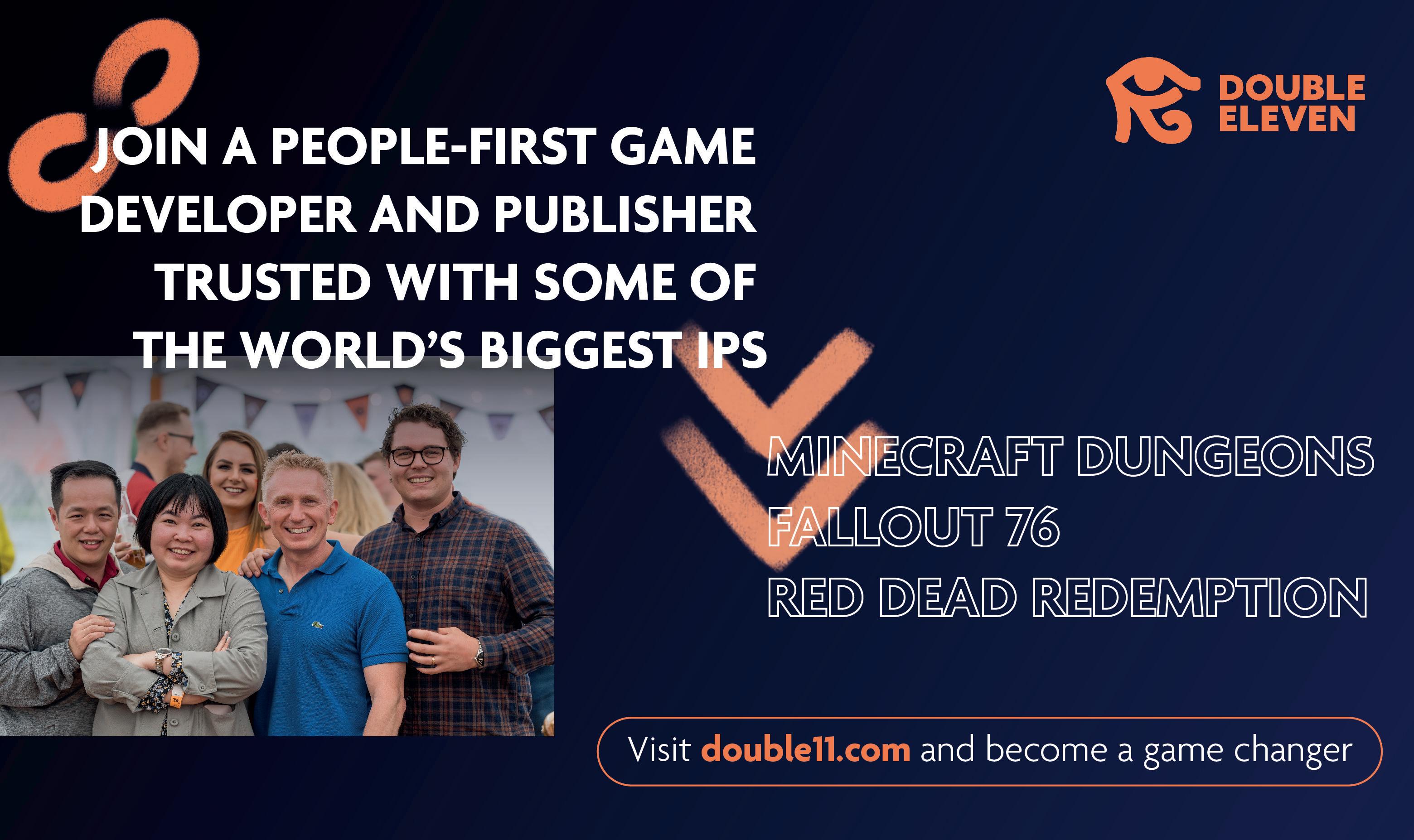

Prioritising staff wellbeing and growth
Iain Farrell, the studio’s Programme Manager, says: “We have a ‘people-first’ philosophy, a commitment to making our industry better, normalising good work-life balance in an industry not always known for that.”

Farrell explains that the games industry has a reputation for burnout. To prevent this, Double Eleven’s leads work in conjunction with staff and partners to set realistic deadlines and provide ongoing development and wellbeing support. Allowing staff to switch to another project for a different partner helps them grow further within the company.
Having a healthy production culture
The studio provides support on every aspect of game production. “We have built our reputation on providing top technical skills, but that grew organically over time. Working so closely with other companies is a privilege. We integrate with our partners to try and feel like a part of their team — but we don’t compromise on our people-first approach,” Farrell says.
Ultimately, working long hours isn’t the best way to get results. It can lead to burnout and decreased productivity.
Instead, Double Eleven prefers to work with teams and partners to define realistic milestones. Staff are not pressured to work overtime; if needed, it is always voluntary and paid.
As the business has grown, it has recruited staff at a rapid pace. It attributes its steady growth to the company’s directors, who are committed to stability and looking after people rather than chasing short-term profits.
“For example, we have expanded our dedicated People and Culture team, which is in charge of our employees’ experience — starting with talent acquisition, continuing with onboarding and then offers ongoing wellbeing and learning and development support,” Farrell explains.
At both studio locations in Middlesbrough and Kuala Lumpur, the company arranges weekend events for colleagues and their families; some of whom have relocated to work at the studio. “We want people to feel welcome, so we arrange family-oriented tours or trips to local landmarks. We also provide perks like birthdays off and permanent access to an online wellbeing support platform because, ultimately, we value staff above all else.”
Farrell insists that if businesses ensure flexibility and a rewarding culture are ingrained into the company, their teams can be empowered to give their best — translating into high-quality, creative work.
Values-driven management which grows sensibly whilst always putting its people first, allows their team staff to do their best work and further secure independence and stability.